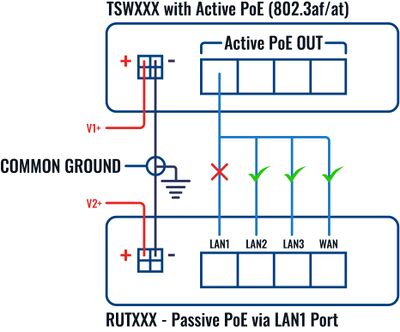TSW101 Powering Options: Difference between revisions
Gytispieze (talk | contribs) (Created page with "{{Template: networking_tsw1xx_manual_powering_options | name = TSW101 | series = TSW1xx }}") |
Gytispieze (talk | contribs) m (Gytispieze moved page Draft:TSW101 Powering Options to TSW101 Powering Options without leaving a redirect) |
(No difference)
| |
Latest revision as of 09:10, 26 July 2022
Main Page > TSW Switches > TSW101 > TSW101 Manual > TSW101 Powering OptionsThis chapter contains information on powering options supported by TSW101 switch.
The switch has a 2 pin power socket and can be powered by a 9-30 VDC power supply unit (PSU). Refer to the image below for the power socket's pinout information:
Power socket
2 pin power socket
| No. | Description | Wire color |  |
|---|---|---|---|
| 1 | Power | Red | |
| 2 | Ground | Black | |
Disclaimer: TSW101 and Passive PoE devices
There are a couple of options to stay safe when using TSW101 Active PoE with devices that only support Passive PoE:
- Connect TSW101 and Passive PoE device only via non-PoE Ethernet ports (for example, do not use TSW101 PoE ports with LAN1 ports on Teltonika devices).
- If there is a need to use LAN1 port on the end device, make sure that TSW101 and the end device are powered from different voltage sources (for example, power both devices from different PSUs, or different batteries).
If TSW101 and a Passive PoE device are connected with common ground, do not use LAN1 port, other ports can be used (refer to image below):
Ground loops
Do not connect the power supply negative terminal of our device to the chassis or earth exclusively.
This connection could cause ground loops. For example, if the antenna shield and power supply negative terminal are connected to the chassis or earth, it forms a ground loop, therefore unwanted current could flow through a device PCB ground and may cause damage.
In networking switches connecting our device power supply negative terminal to the chassis or earth could cause damage to other devices connected to the switch or unintentional power up of other devices.


